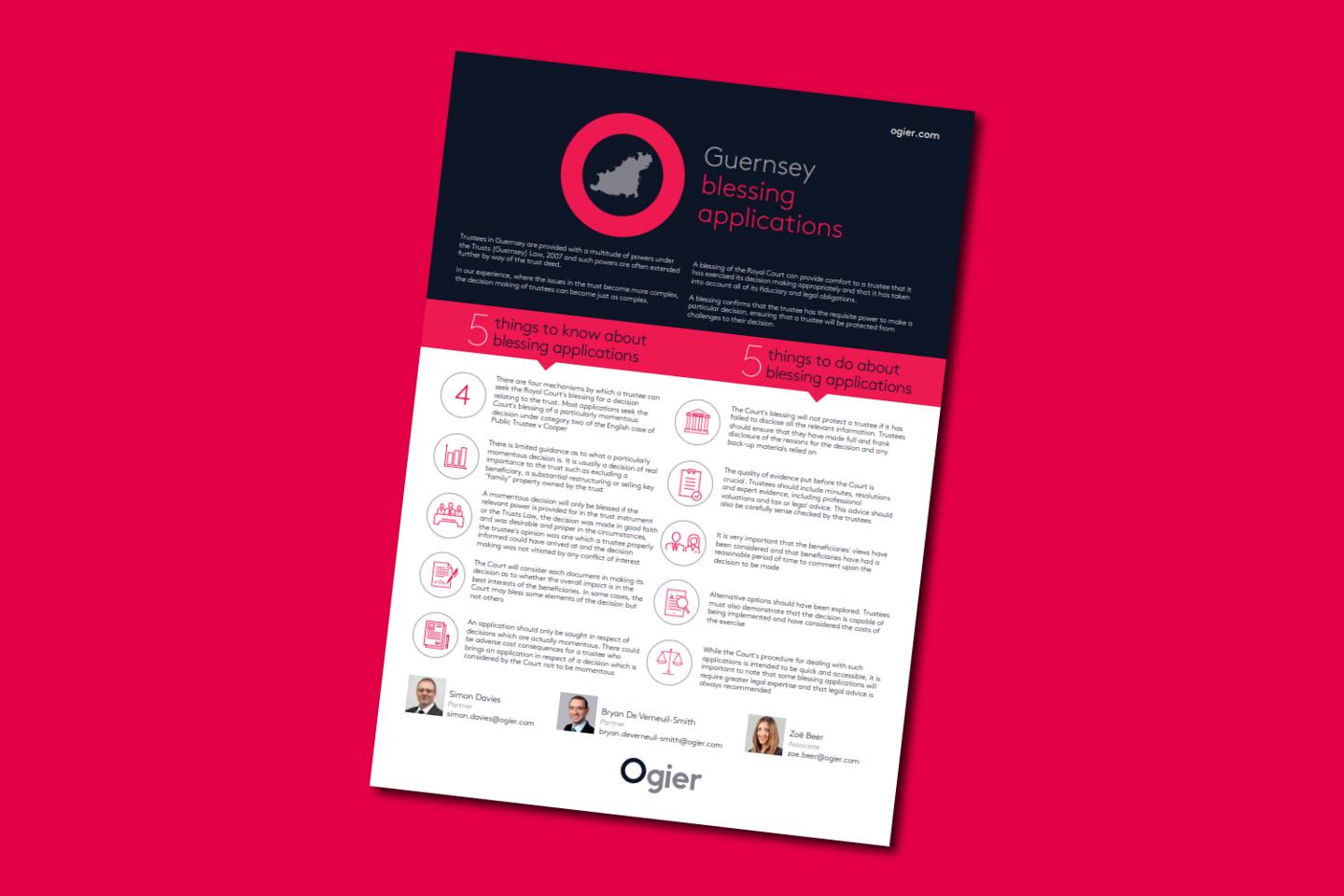
Simon Davies
Partner | Legal
Guernsey

Simon Davies
Partner
Guernsey
Big things are happening at Ogier. Change is embedded in everything we do. It is redefining our talent, our ways of working, our platforms of delivery, our culture.
Services
We have the expertise to handle the most demanding transactions. Our commercial understanding and experience of working with leading financial institutions, professional advisers and regulatory bodies means we add real value to clients’ businesses.
Sectors
Our sector approach relies on smart collaboration between teams who have a deep understanding of related businesses and industry dynamics. The specific combination of our highly informed experts helps our clients to see around corners.
We have the expertise to handle the most demanding transactions. Our commercial understanding and experience of working with leading financial institutions, professional advisers and regulatory bodies means we add real value to clients’ businesses.
Legal
Corporate and Fiduciary
Consulting
Banking and Finance
Corporate
Dispute Resolution
Employment law
Intellectual Property
Investment Funds
Listing services
Local Legal Services
Private Wealth
Property law
Regulatory
Restructuring and Insolvency
Tax
Banking and Finance overview
Asset Finance
CAYLUX Fund Finance
Debt Capital Markets
Derivatives
Fund Finance
Islamic Finance
Leveraged Finance
Listing services
Real Estate Finance
Regulatory
Restructuring and Insolvency
Structured Finance
Sustainable Finance
Corporate overview
Economic Substance
EIIS Services in Ireland
Equity Capital Markets
Insurance and Reinsurance
Listing services
Mergers and Acquisitions
Private Equity
Real Estate Structuring, Acquisitions and Disposals
Regulatory
Technology and Web3
Dispute Resolution overview
Banking Disputes
Corporate and Financial Services Disputes
Crypto Disputes
Enforcement of Judgments and Awards
Fraud and Asset Tracing
Funds Disputes
Insurance Disputes
International Arbitration
Regulatory
Restructuring and Insolvency
Section 238 Shareholder Appraisal Rights
Shareholder and Valuation Disputes
Trusts Disputes and Applications
Investment Funds overview
Hedge Funds
Managers and Sponsors
Private Equity
Real Estate, Infrastructure and Energy Funds
Regulatory
Sustainable Investing and Impact Funds
Technology and Web3
Local Legal Services overview
Cayman Local Legal Services
Channel Islands Local Legal Services
Ireland Local Legal Services
Employment law
Estate Planning, Wills and Probate
Expat services
Family Office
Intellectual Property
Make your Guernsey will online
Make your Jersey lasting power of attorney online
Make your Jersey will online
Notary public services
Relocating your business
Relocating your family
Property law
Accounting and Financial Reporting Services - Ogier Global
Cayman Islands AML/CFT training - Ogier Global
Corporate Services - Ogier Global
Debt Capital Markets - Ogier Global
Fund Services - Ogier Global
Governance Services - Ogier Global
Investor Services - Ogier Global
Ogier Connect - Ogier Global
Private Wealth Services - Ogier Global
Real Estate Services - Ogier Global
Regulatory and Compliance Services - Ogier Global
Our sector approach relies on smart collaboration between teams who have a deep understanding of related businesses and industry dynamics. The specific combination of our highly informed experts helps our clients to see around corners.
Ogier provides practical advice on BVI, Cayman Islands, Guernsey, Irish, Jersey and Luxembourg law through our global network of offices across the Asian, Caribbean and European timezones. Ogier is the only firm to advise on this unique combination of laws.
Keep up to date with industry insights, analysis and reviews. Find out about the work of our expert teams and subscribe to receive our newsletters straight to your inbox.
Fresh thinking, sharper opinion.
We get straight to the point, managing complexity to get to the essentials. Our global network of offices covers every time zone.
No Content Set
Exception:
Website.Models.ViewModels.Components.General.Banners.BannerComponentVm

ON THIS PAGE
Trustees in Guernsey are provided with a multitude of powers under the Trusts (Guernsey) Law, 2007 and such powers are often extended further by way of the trust deed.
In our experience, where the issues in the trust become more complex, the decision making of trustees can become just as complex.
A blessing of the Royal Court can provide comfort to a trustee that it has exercised its decision making appropriately and that it has taken into account all of its fiduciary and legal obligations.
A blessing confirms that the trustee has the requisite power to make a particular decision, ensuring that a trustee will be protected from challenges to their decision.
There are four mechanisms by which a trustee can seek the Royal Court's blessing for a decision relating to the trust. Most applications seek the Court's blessing of a particularly momentous decision under category two of the English case of Public Trustee v Cooper.
There is limited guidance as to what a particularly momentous decision is. It is usually a decision of real importance to the trust such as excluding a beneficiary, a substantial restructuring or selling key "family" property owned by the trust.
A momentous decision will only be blessed if the relevant power is provided for in the trust instrument or the Trusts Law, the decision was made in good faith and was desirable and proper in the circumstances, the trustee's opinion was one which a trustee properly informed could have arrived at and the decision making was not vitiated by any conflict of interest.
The Court will consider each document in making its decision as to whether the overall impact is in the best interests of the beneficiaries. In some cases, the Court may bless some elements of the decision but not others.
An application should only be sought in respect of decisions which are actually momentous. There could be adverse cost consequences for a trustee who brings an application in respect of a decision which is considered by the Court not to be momentous.
The Court's blessing will not protect a trustee if it has failed to disclose all the relevant information. Trustees should ensure that they have made full and frank disclosure of the reasons for the decision and any back-up materials relied on.
The quality of evidence put before the Court is crucial. Trustees should include minutes, resolutions and expert evidence, including professional valuations and tax or legal advice. This advice should also be carefully sense checked by the trustees.
It is very important that the beneficiaries' views have been considered and that beneficiaries have had a reasonable period of time to comment upon the decision to be made.
Alternative options should have been explored. Trustees must also demonstrate that the decision is capable of being implemented and have considered the costs of the exercise.
While the Court's procedure for dealing with such applications is intended to be quick and accessible, it is important to note that some blessing applications will require greater legal expertise and that legal advice is always recommended.

Simon Davies
Partner | Legal
Guernsey

Simon Davies
Partner
Guernsey
Contact Simon
Back

Bryan De Verneuil-Smith
Partner | Legal
Guernsey

Bryan De Verneuil-Smith
Partner
Guernsey
Contact Bryan
Back
Sign up to receive updates and newsletters from us.
Sign up
No Content Set
Exception:
Website.Models.ViewModels.Blocks.SiteBlocks.CookiePolicySiteBlockVm
